With the Democratic National Convention slated to start days from now in Chicago, many in the party are thrilled to channel a sudden burst of energy surrounding Vice President Kamala Harris — who is already certified as the presidential nominee — and emerge unified in taking a “joyful” fight to Donald Trump in the general election.
But it won’t be that easy.
The ongoing carnage of Israel’s war in Gaza and the threat of a widening war throughout the Middle East raises a profound note of discord amid what party leaders want to be a harmonious gathering.
Protest against the Biden-Harris administration’s support for Israel is expected inside and outside Chicago’s United Center, where the Democratic National Convention will take place.
In interviews with Raw Story this month, pro-Palestine convention delegates, who together represent hundreds of thousands of voters who withheld their votes from Joe Biden during the primaries, indicate they’ll press the case on the convention floor for a ceasefire and arms embargo against Israel.
ALSO READ: Why ‘vanilla’ Tim Walz is the ingredient to beat Trump: Dem lawmakers
Meanwhile, in the surrounding streets, potentially thousands of protesters — some radicalized by the experience of police crackdowns against pro-Palestine college campus encampments earlier this year — are angling to the Biden-Harris administration for propping up what they consider the worst human rights atrocity of the 21st century.
An insistent demand to account for the Gaza dead will be heard, they say, a Democratic Party unity-fest be damned.
“I do think it’s important to see that this movement is not fringe,” Asma Mohammed, an uncommitted delegate, told Raw Story. “It’s full of people across the country who are considering whether they’re going to show up at the polls at all.”
And while Mohammed said the uncommitted delegates are not coordinating with the protesters outside the convention hall, she said she hopes their voices will be heard by presumptive nominee Kamala Harris.
“We are trying to get these demands met so that our people do not have to be in the street demanding change at the risk of being arrested, at the risk of being maced, at the risk of being chased by police,” Mohammed said. “It’s terrifying to have to do that. We want Kamala Harris to see that we are willing to do that to save the lives of people in Palestine.”
The specter of violence has loomed over the convention, with the 1968 Democratic convention as a cautionary tale of police overreaction turning protests into bedlam and the party emerging fractured and weakened. The city repaired some of its reputation with a Democratic convention that went off without a hitch in 1996, but Chicago experienced significant unrest during protests in the summer of 2020 over the murder of George Floyd.
The two camps of pro-Palestine advocacy at this year’s Democratic convention are raising almost identical demands, but the stakes for each are wildly different.
Many of the pro-Palestine activists in the “uncommitted” movement work in organizations that advocate for goals that benefit working people, such as school funding. They can’t necessarily afford to alienate Democratic Party officials, including Harris’ recently announced running mate, Minnesota Gov. Tim Walz.
But protesters with no ties to the party may feel they have nothing to lose. By the very nature of a national convention — and with images of the Democrats’ violent 1968 convention in Chicago firmly in mind — thousands of people with varying agendas are converging in one place at the same time, with the potential for confusion and unpredictable results.
Here’s what you should prepare for.
Inside the convention hall: ‘uncommitted’ to Harris
Thirty uncommitted delegates across Michigan, Minnesota and Hawaii — those who are not supporting Harris — are going into the convention with two demands that appear highly unlikely to be met: an immediate and permanent ceasefire in Gaza, and an arms embargo against Israel.
They are also requesting a meeting with Harris and calling for the Democratic National Committee to provide a five-minute speaking role to Dr. Tanya Haj-Hassan, a pediatric intensive care physician who has witnessed the war up close by working in a hospital in Gaza.
They are further asking for space at the convention for a daily vigil, and for programming such as a panel discussion or debate about the different views within the party on the war between Israel and Hamas, which governs Gaza. Israel has been fighting Hamas for more than 10 months after Hamas militants attacked and killed more than 1,100 people in Israel — mostly civilians — and kidnapped more than 200 others.
“Folks are asking if we’re going to endorse Harris,” Mohammed told Raw Story. “Until we have that meeting, there’s no chance of us feeling there’s any alignment in our values.”
So far, the Harris-Walz campaign has not responded to the request for a meeting. The Democratic National Committee likewise has given no indication as to whether an advocate for Palestine will receive a speaker slot.
The Harris-Walz campaign and Democratic National Committee did not respond to messages from Raw Story seeking comment.
A Democratic Party platform draft released last month gives pro-Palestinian protestors little purchase, as it states that the Democratic Party’s commitment to Israel’s security is “ironclad,” as is its commitment to Israel’s “its qualitative military edge” over enemies.
Colin Kahl, a former under secretary at the U.S. Department of Defense, who co-wrote the section of the platform that addresses the Middle East, emphasized during a meeting of the platform committee last month that the document reflects Biden and Harris’ belief in “the worth of every innocent life, whether Israeli or Palestinian.”
Elianne Farhat, co-chair of the National Uncommitted Movement, had previously addressed the committee while raising the demand for a ceasefire and arms embargo.
“I don’t believe that language would be in there without the organizing of the uncommitted movement,” she said. “If that’s their attempt to placate us, it is wholly insufficient.”
Mohammed downplayed the possibility of disruption inside the convention hall.
ALSO READ: We asked 10 Republican senators: ‘Is Kamala Harris Black?’ Things got weird fast.
“We’re people with roles within the party,” she said. “We want to ensure that we’re following the rules in the party.”
She added that simply being elected as delegates on behalf of the 10,000 people who voted uncommitted in the Michigan primary “is an act of protest.”
Others in the uncommitted movement have suggested that even if the Democratic Party doesn’t meet their demands, that doesn’t mean pro-Palestine voices won’t be heard within the United Center.
Layla Elabad, a community organizer in Michigan, told Mother Jones that even if Dr. Haj-Hassan doesn’t receive a formal speaker slot, “we’ll find a way for her to speak, one way or another, in the tradition of Fannie Lou Hamer, who made a moral witness to human suffering at the 1964 DNC.”
Hamer was the co-founder of the Mississippi Freedom Democratic Party, which sought to be recognized in place of the all-white official delegation at the 1964 Democratic convention. Hamer’s speech to the credentials committee was televised for a national audience and vividly described the horrors of racial segregation in the South.
Outside the convention hall: a militant left
For their part, protest leaders who won’t be credentialed inside the convention hall have made it clear that they hold the Biden-Harris administration responsible for the death toll in Gaza — more than 39,000 people by late July, according to Palestinian health authorities.
And on this specific issue, they make no distinction between the Democratic Party and the Republican Party.
“Our aim is to bring together tens of thousands of people to call for ending genocide and ending U.S. aid to Israel,” Faayani Aboma Mijana, a spokesperson for the Coalition to March on the DNC, told Raw Story.
But Mijana said these protesters are not looking for strategic allies inside the convention hall. They acknowledged there are elected officials in the Democratic Party “who are friendly to what we’re trying to do,” but the one person they cited as an example — Rep. Cori Bush (D-MO) — was knocked out in her primary on Tuesday by an opponent who received heavy financial backing from pro-Israel lobbying groups.
“We know the source of change is not going to come from within the party,” Mijana said. “Our focus is on building a mass movement outside of Washington. The change is not going to come from within the parties; it’s going to be brought about by the movement outside of it.”
ALSO READ: 'A fantasy of manhood': Are frat boys the new Proud Boys?
The protesters have pledged to do their part to minimize the risk of violence, while the Chicago police have signaled they will draw a hard line against unrest.
Mijana said protest leaders are planning a “peaceful, family friendly” event that will be inclusive of everyone, regardless of immigration and disability status. Similar to the protest against the Republican National Convention in Milwaukee last month, the Chicago protest leaders are securing permits and plan to utilize marshals to guide protesters and de-escalate and potentially confrontations with counter-protesters.
Chicago police Superintendent Larry Snelling warned during a press conference last month: “Physical responses to violence and civil unrest on the part of those who come here with plans to damage the city or reputation of the city or to hurt people — the response is never going to be pretty. But it will be constitutional.”
Palestine is front and center in the March Against the DNC, planned for the first and final days of the convention, although protesters are also highlighting mass incarceration, the crackdown on undocumented immigrants, and women’s and LGBTQ+ rights.
While Mijana said organizers are committed to keeping protesters safe, the potential for convention-related chaos to usher in a second Trump administration is simply not a factor in their considerations.
“Our view is, how much worse can it get?” they told Raw Story. “There’s already a genocide that’s killed 40,000 people. An entire city of 2 million people has been displaced. People are starving. People are being raped and tortured. It’s already the worst human rights atrocity of this century.”
James Zogby, pollster and founder of Arab American Institute, likewise expressed deep concern about “40,000 people dead — at least,” noting that “people are upset and have a right to be.”
But Zogby cautioned that “people also have the need to be responsible in that we are winning the public relations war.
“There’s far greater sympathy among Democrats towards the Palestinians and what they’ve endure. There’s far greater support for change in policy,” he told Raw Story in a phone interview. “We have to be careful in how the demonstrations unfold so that they make a point to move forward support instead of alienating potential allies. I’m not sure everyone has that goal. They’re using slogans like ‘Genocide Joe’ and ‘Killer Kamala. That’s not helpful.”
The 1968 analogy
Both protesters and pro-Trump forces watching the convention from the sidelines have leaned into the 1968 analogy, while the pro-Palestine forces planning to attend the convention have vowed they will not be bullied into silence in the name of preserving party unity.
“It’s something that we are hyper-aware of, is ’68, and it’s something we’ve been constantly thinking about and talking about,” said Danaka Katovich, co-director of activist group Code Pink, during a group webinar on Aug. 1 while discussing planning for the protests. “We’ve identified this DNC as a leverage point, something to take advantage of, especially with the internal political strife in the Democratic Party.”
As early as this spring, Christopher Rufo, a conservative intellectual credited with weaponizing “critical race theory” and “diversity, equity and inclusion” as culture-war smears against the left, has identified the protests against the war in Gaza as a new point of attack against Democrats. Ignoring the antipathy between the party and the protesters, Rufo and other conservative strategists hope to create a linkage in the minds of swing voters between radical left-wing protesters and the Democratic Party.
In an essay titled “The Left’s Hamas Problem that he published in April, Rufo wrote: “The encampment escalation divides the left, alienates influential supporters, and creates a sense of chaos that will move people against it. The correct response from the right is to create the conditions for these protests to thrive in blue cities and campuses…. If these protests become more volatile and go all the way to the Democratic convention in Chicago, we could see a 1968 scenario. That didn’t work out too well for the Democrats.”
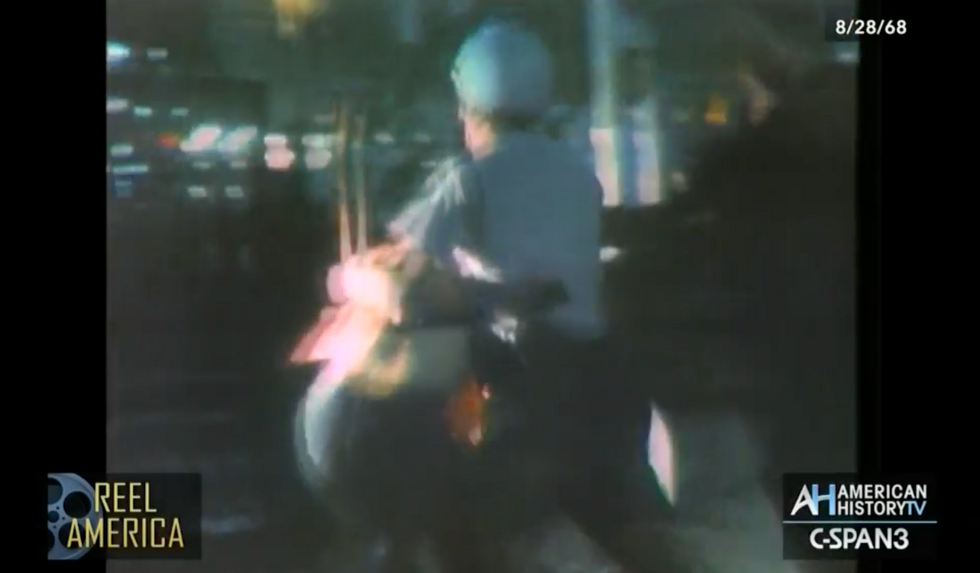 Police clash with protesters outside the 1968 Democratic National Convention in Chicago. (Courtesy: C-SPAN)
Police clash with protesters outside the 1968 Democratic National Convention in Chicago. (Courtesy: C-SPAN)
It also didn’t work out well for the antiwar movement.
Bill Ayers, a former Students for a Democratic Society leader who protested the 1968 Democratic National Convention, cited one success in his remarks during the Code Pink webinar. The police response stripped away any illusions the protesters might have that American power could be bent towards good, he said.
“What we succeeded in was showing the system for what it was,” Ayers said. “It was a militarized, militaristic response to protesters who simply wanted their voices to be heard to stop a genocide. And what did they do? They had a police riot. So, we showed the world: This is what American power rests on. I think it was a huge success.”
But Ayers readily acknowledged that the 1968 protests completely failed in a material sense.
“We did not end the war in 1968,” he said. “A million people were dead, but the war ground on, and [National Security Adviser] Henry Kissinger and Richard Nixon expanded the war…. It went on for another… seven years. So, we can’t claim a huge victory…. What we set out to do was end a genocidal war, and we did not do that…. We didn’t stop the war, and that was our minimum program.”
While the parallels between 1968 and 2024 are striking, there are also notable differences.
The Democratic Party was far more divided in 1968, with hopes for a “peace” candidate dashed first by the assassination of Robert F. Kennedy coupled with party leaders sidelining Eugene McCarthy at the convention.
In contrast, when Joe Biden dropped out of the race last month, Democrats quickly coalesced around Harris. And unlike in 1968, when eventual Democratic nominee Hubert Humphrey came from the pro-war faction of the party, Harris is acknowledged among protesters as being more sympathetic to the plight of the Palestinian people than Biden.
Medea Benjamin, co-founder of Code Pink, remarked during the Aug. 1 webinar that beyond the antiwar movement, voters who would ordinarily be supportive of the Palestinian cause are likely to rally around Harris “because of their fear of Trump.”
Farhat, the co-chair of the National Uncommitted Movement, declined to speculate on what strategies uncommitted delegates might employ to press their case inside the convention hall. But she said they’ll be recruiting so-called “ceasefire” delegates among those committed to the nominee “to be part of a visible presence for Palestinian lives.”
And, she said, their efforts won’t end with the convention.
“Uncommitted delegates are very clear on who they are representing,” she said. “That’s the more than 700,000 voters who voted in the primaries. That’s who we are representing, and we will stay true and focused on being accountable to them, as well as the Palestinian leadership — to not give up ground on this critical issue.”
Editor's note: Following publication of this story, the Uncommitted National Movement confirmed in a press release that two leaders met with Vice President Kamala Harris and Gov. Tim Walz before their rally in Detroit on Wednesday.
According to the leaders, Layla Elabed and Abbas Alawieh, Harris "shared her sympathies and expressed an openness to a meeting with Uncommitted leaders to discuss an arms embargo."
Phil Gordon, Harris' national security advisor, said in an apparent response to the Uncommitted leaders in a post on X on Thursday that Harris "does not support an arms embargo on Israel" and "will continue to work to protect civilians in Gaza and to uphold international humanitarian law."



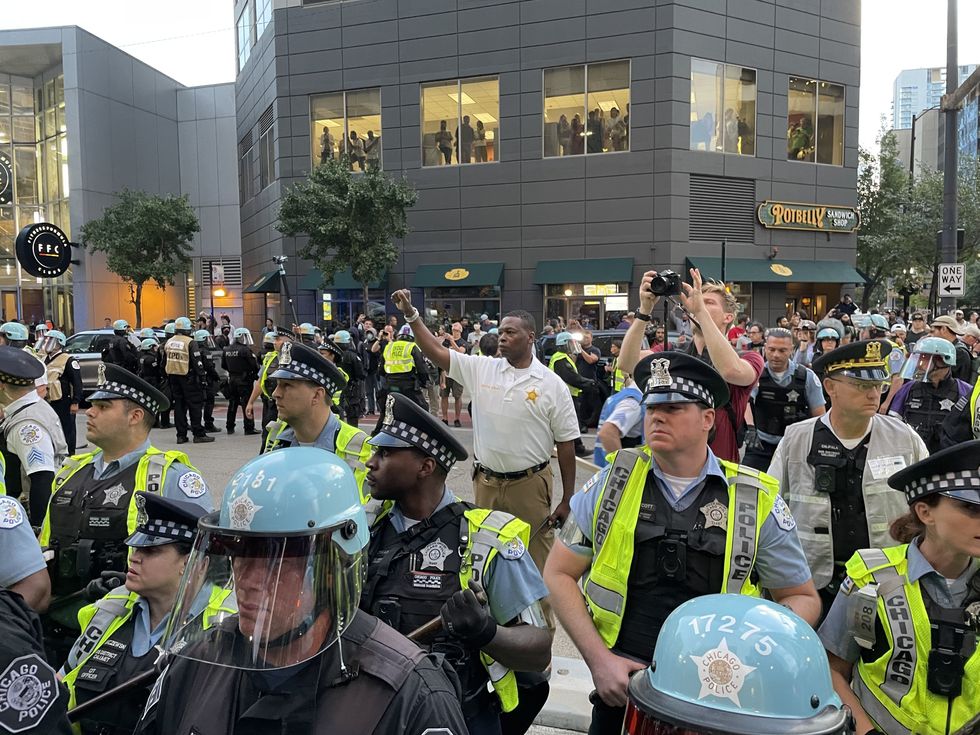 (A Chicago police commander raises his fist while standing behind a police line near the Israeli consulate on Tuesday. (Jordan Green /
(A Chicago police commander raises his fist while standing behind a police line near the Israeli consulate on Tuesday. (Jordan Green /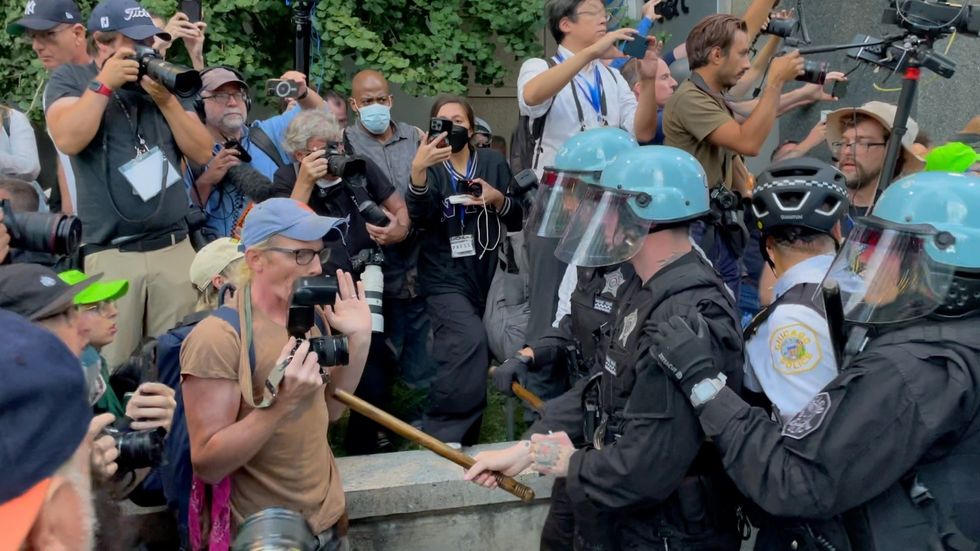 Chicago police confront a photojournalist near the Israeli consulate on Aug. 20, 2024, in downtown Chicago. (Jordan Green / Raw Story)
Chicago police confront a photojournalist near the Israeli consulate on Aug. 20, 2024, in downtown Chicago. (Jordan Green / Raw Story)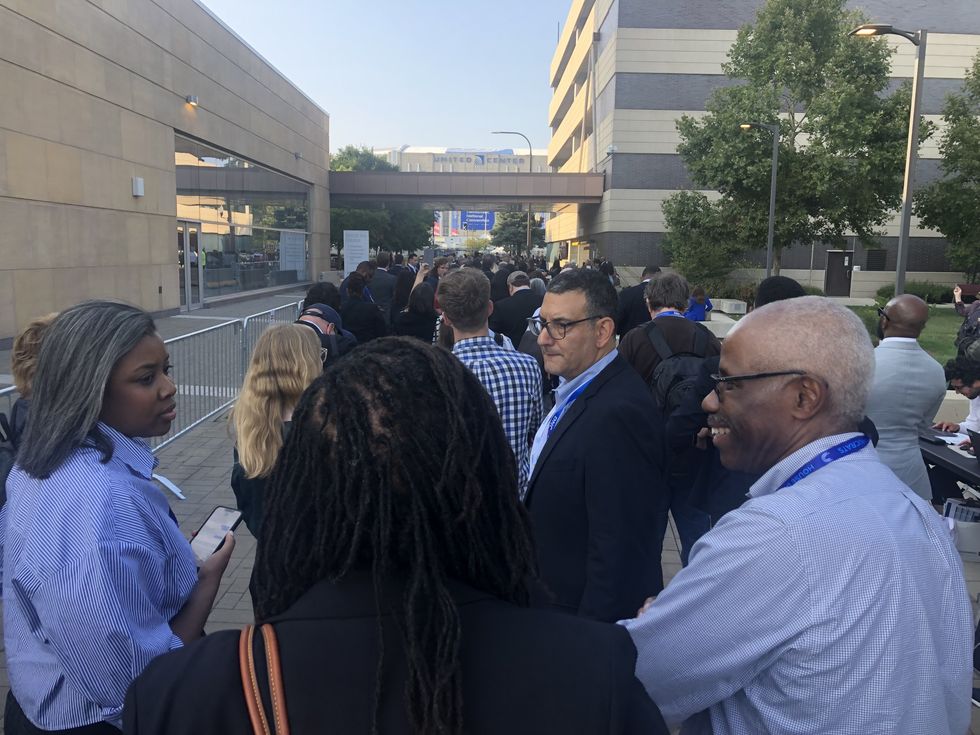 A long line of delegates and others who abandoned protest-delayed buses make their way to the United Center in Chicago, where the Democratic National Convention begins today, Aug. 19, 2024. (Alexandria Jacobson / Raw Story)
A long line of delegates and others who abandoned protest-delayed buses make their way to the United Center in Chicago, where the Democratic National Convention begins today, Aug. 19, 2024. (Alexandria Jacobson / Raw Story)  Police clash with protesters outside the 1968 Democratic National Convention in Chicago. (Courtesy: C-SPAN)
Police clash with protesters outside the 1968 Democratic National Convention in Chicago. (Courtesy: C-SPAN)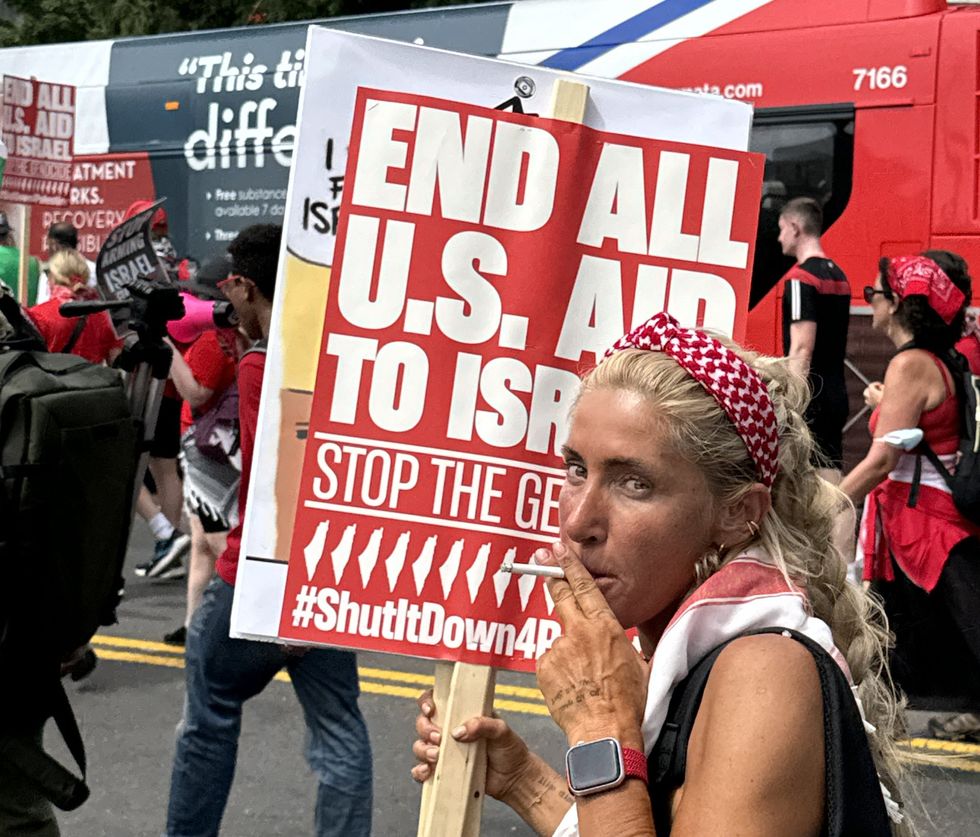 An anti-Netanyahu protester moves toward the U.S. Capitol on July 24, 2024. (Matt Laslo / Raw Story)
An anti-Netanyahu protester moves toward the U.S. Capitol on July 24, 2024. (Matt Laslo / Raw Story)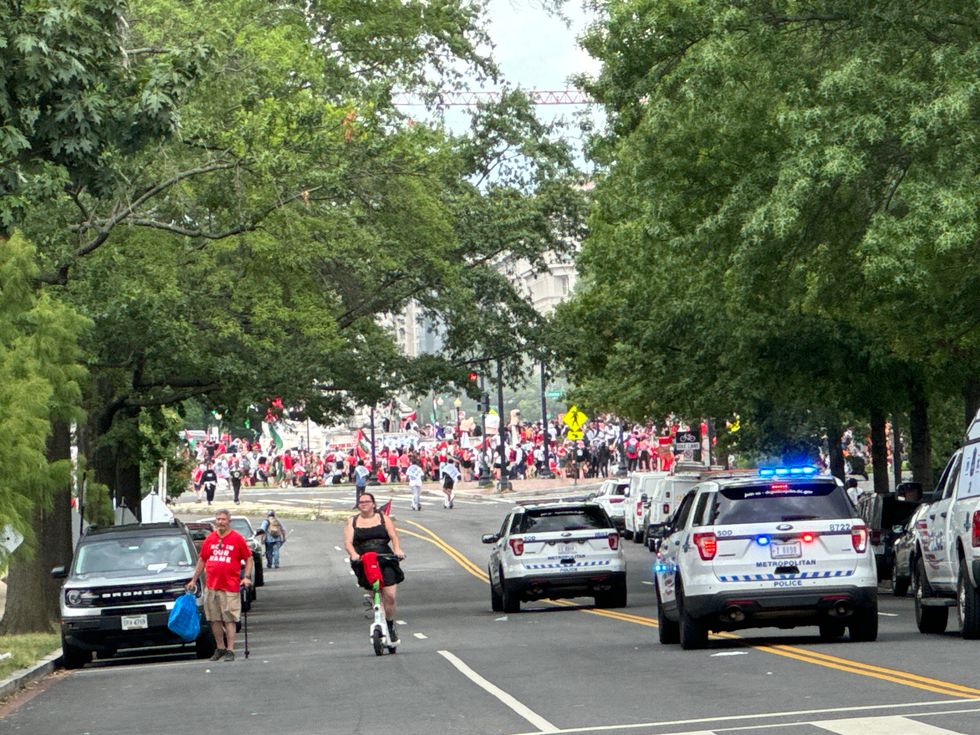 Police stand watch outside the U.S. Capitol and anti-Netanyahu protesters march on July 24, 2024. (Matt Laslo / Raw Story)
Police stand watch outside the U.S. Capitol and anti-Netanyahu protesters march on July 24, 2024. (Matt Laslo / Raw Story)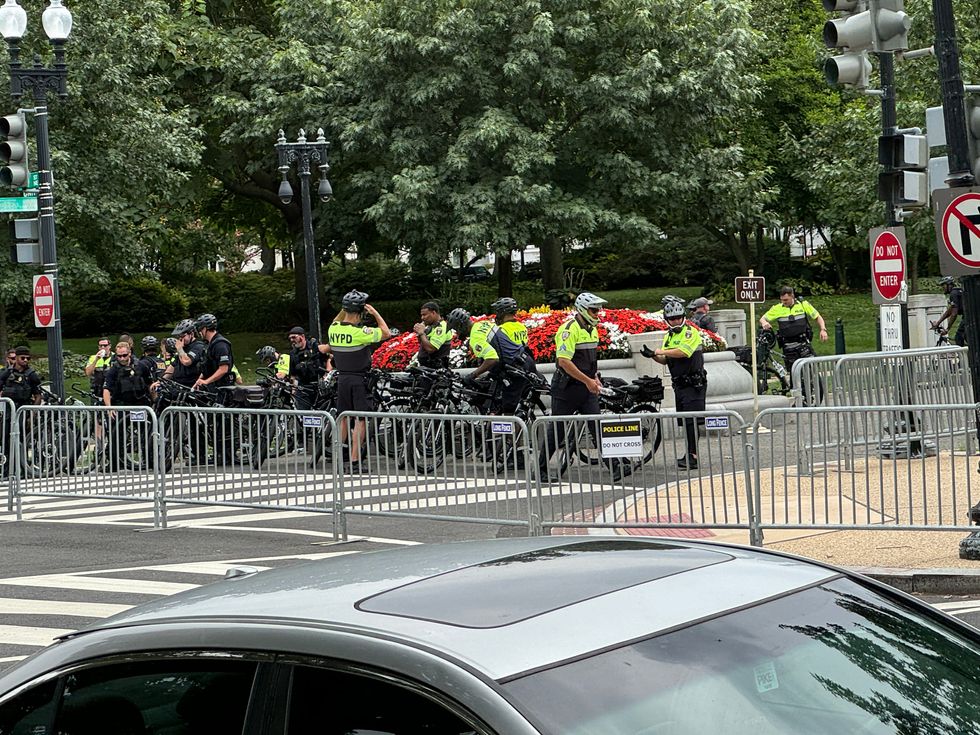 Law enforcement officials, including New York Police Department officers, form a security perimeter near the U.S. Capitol on July 24, 2024. (Matt Laslo / Raw Story)
Law enforcement officials, including New York Police Department officers, form a security perimeter near the U.S. Capitol on July 24, 2024. (Matt Laslo / Raw Story)